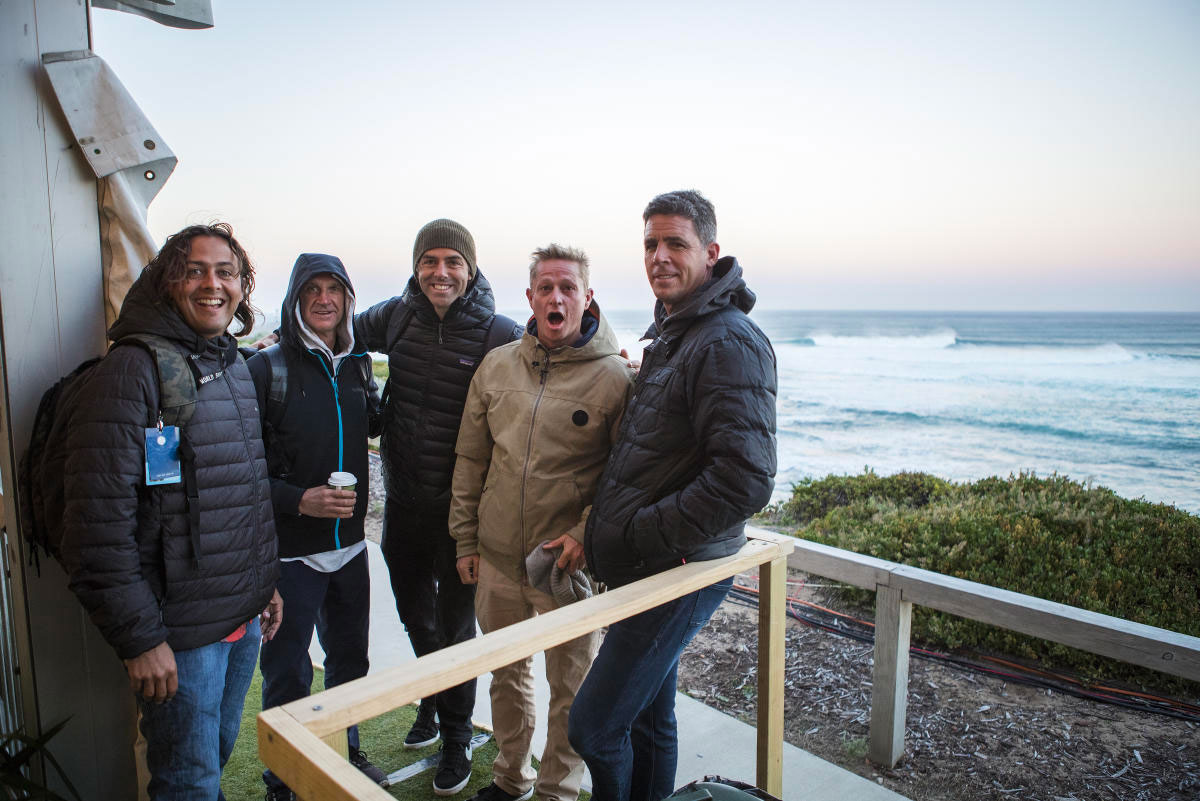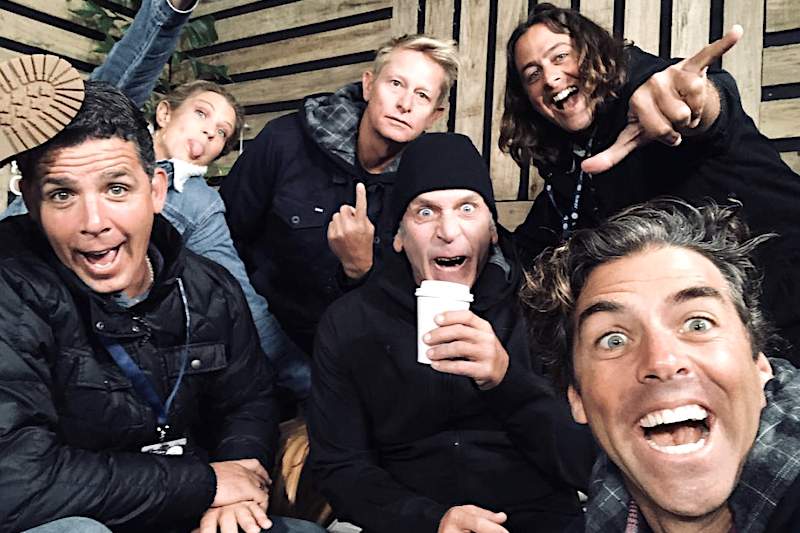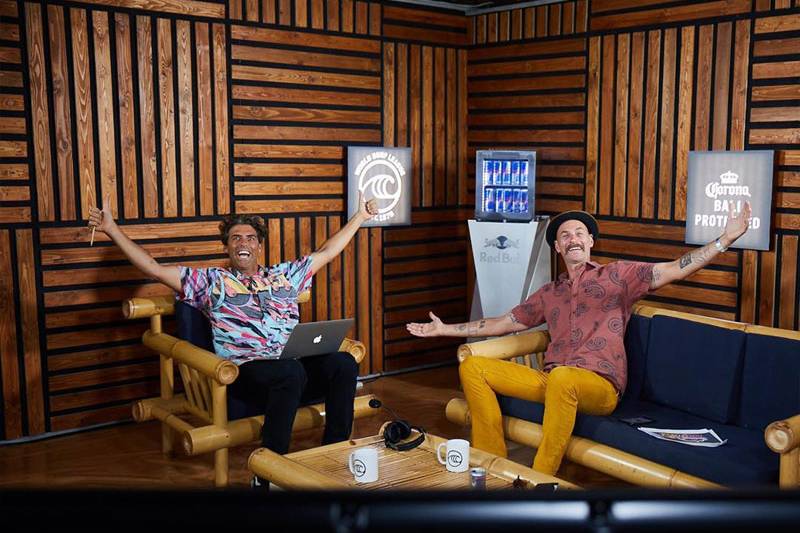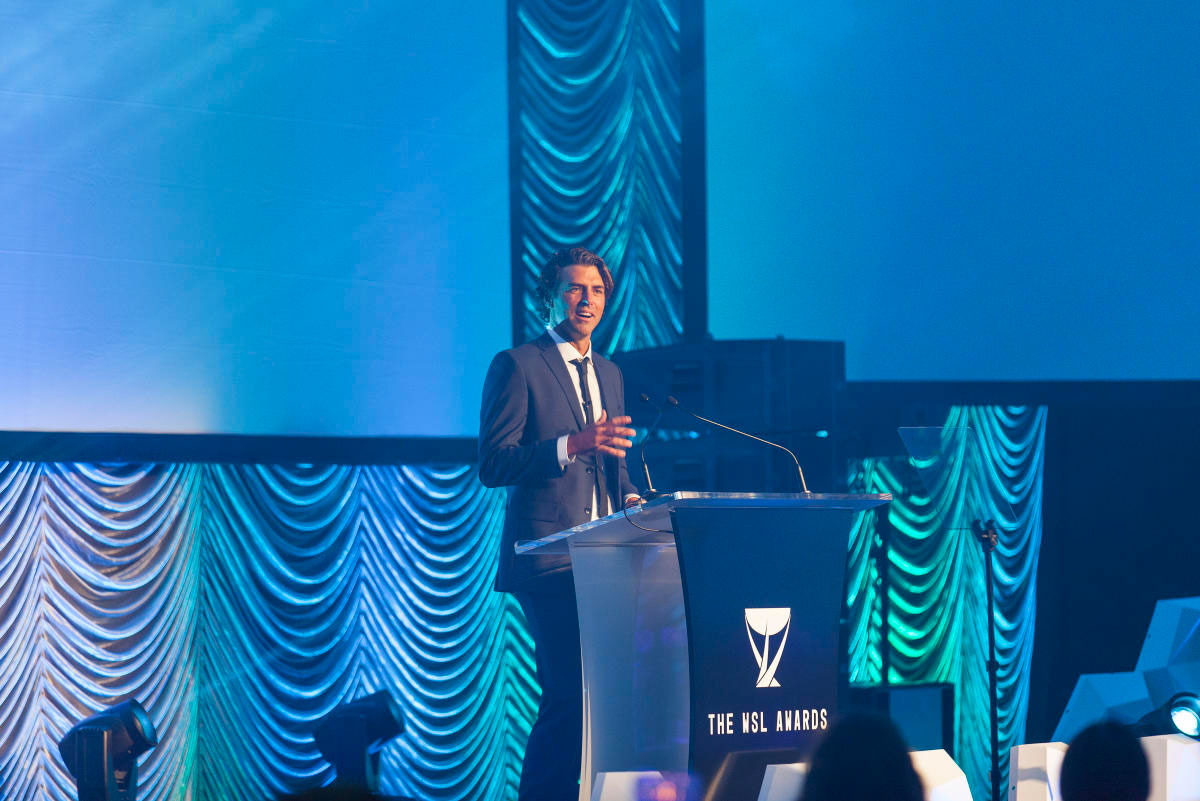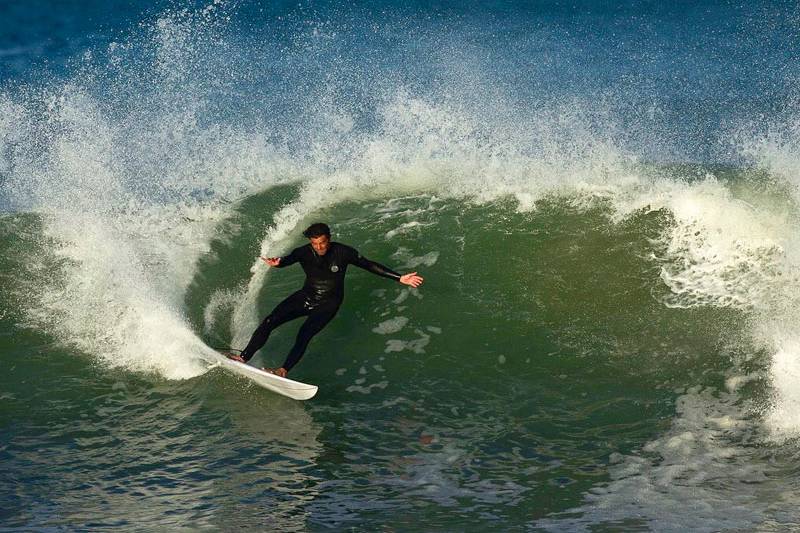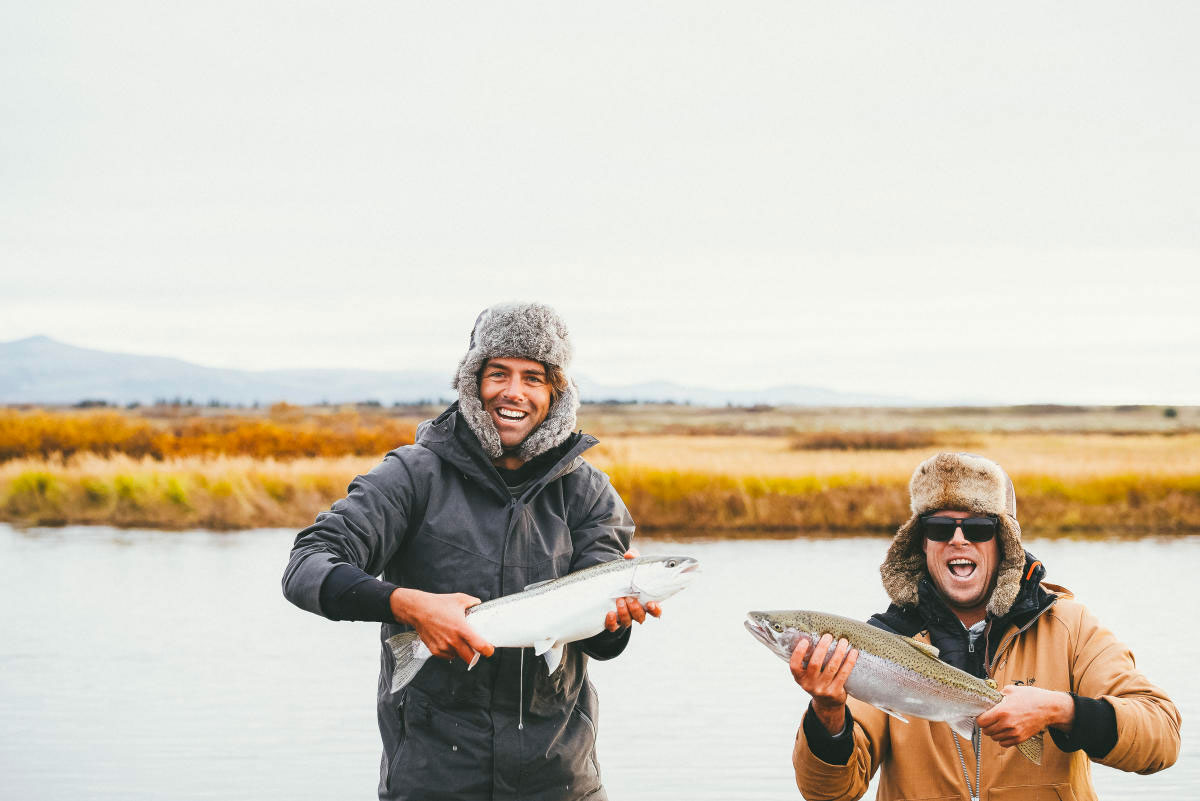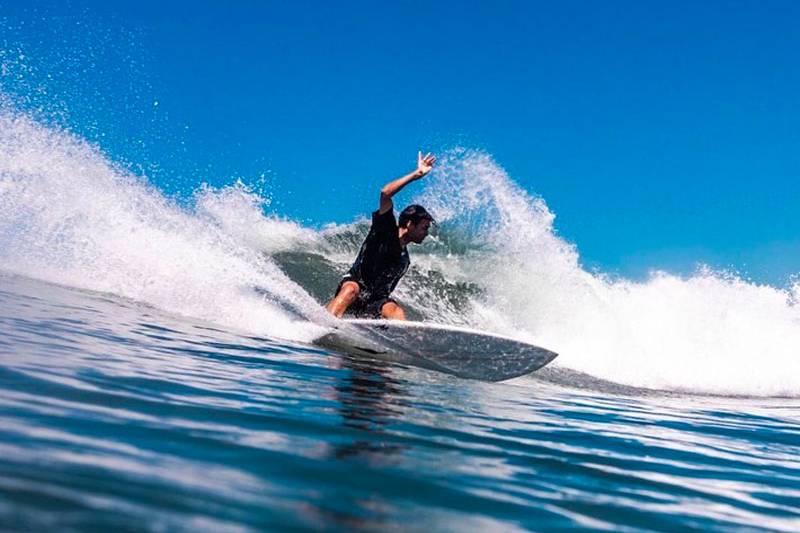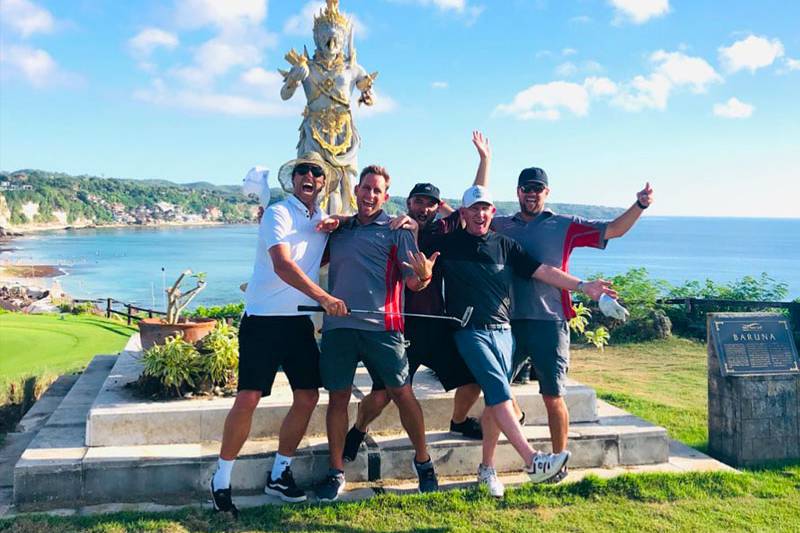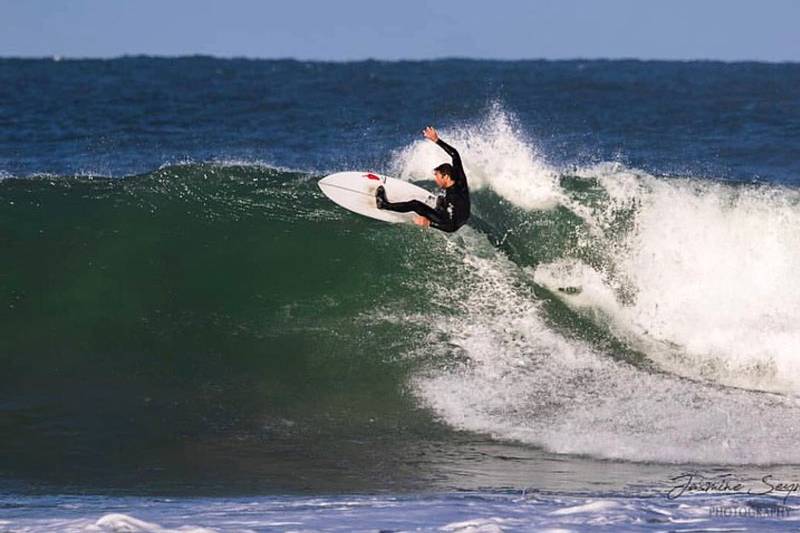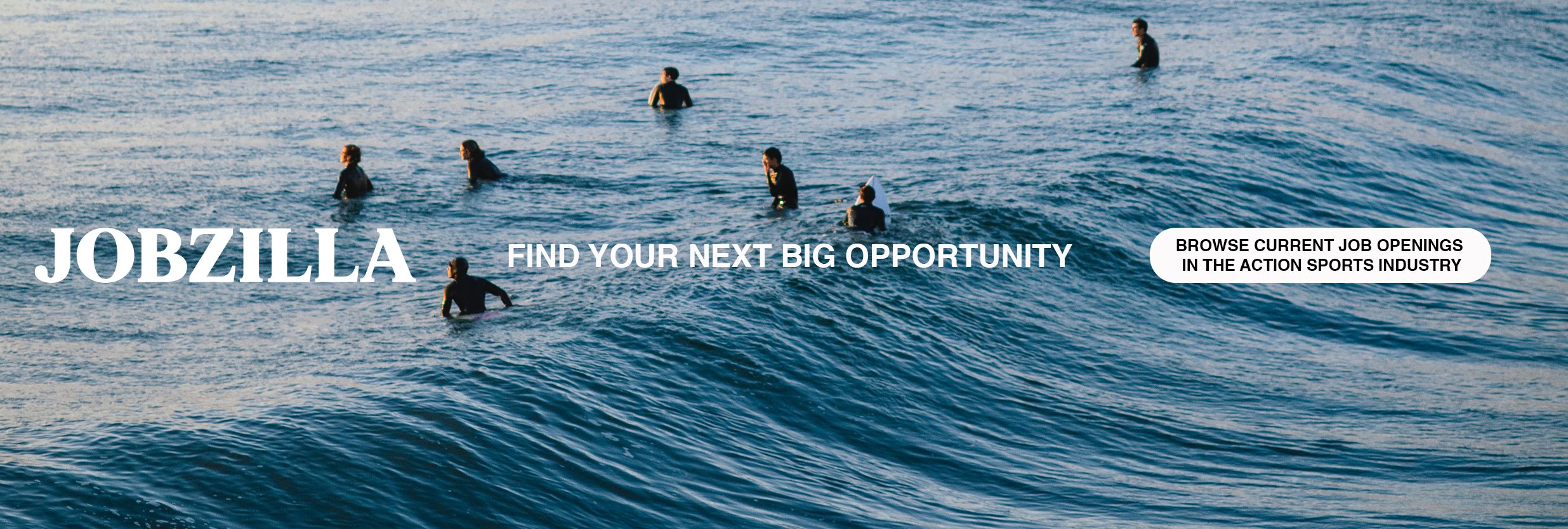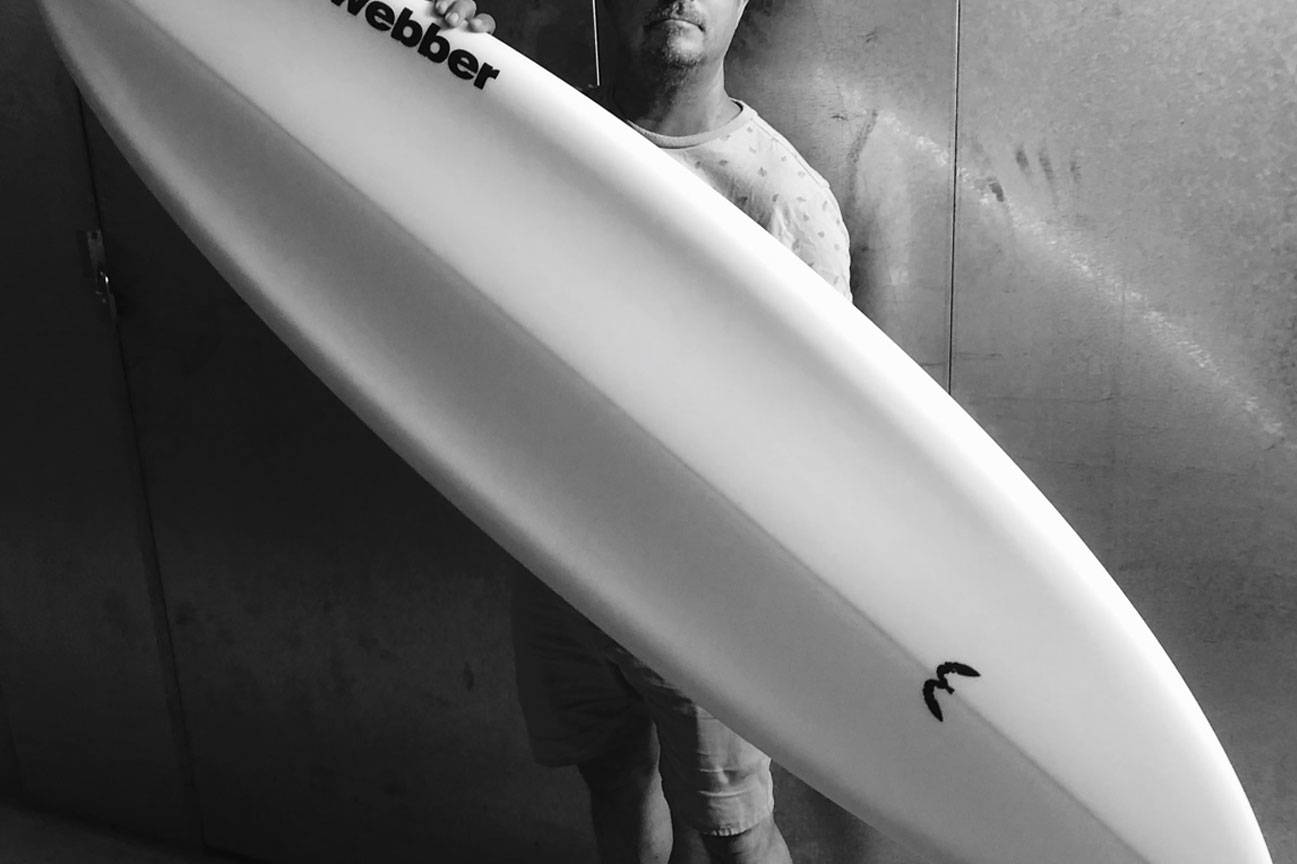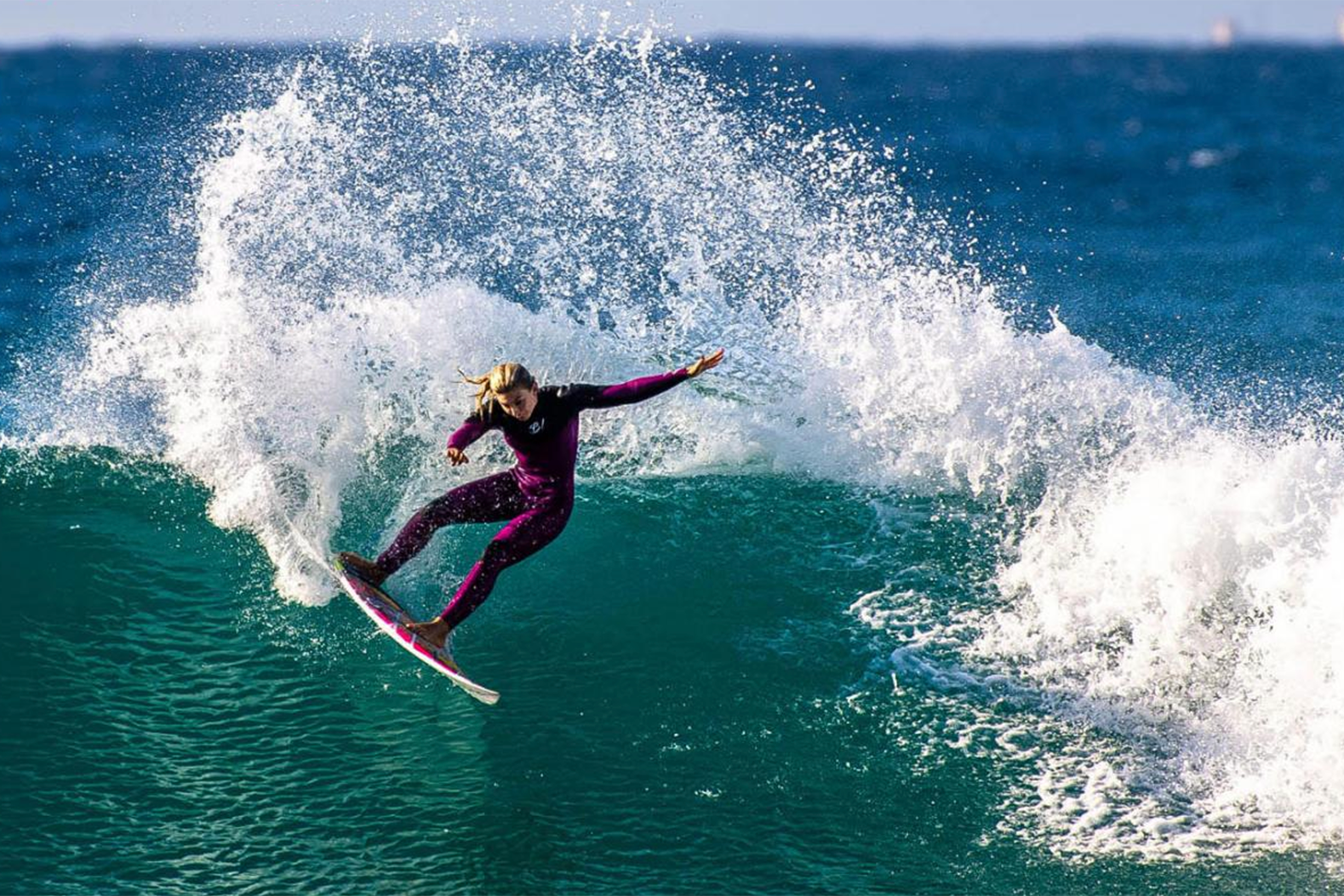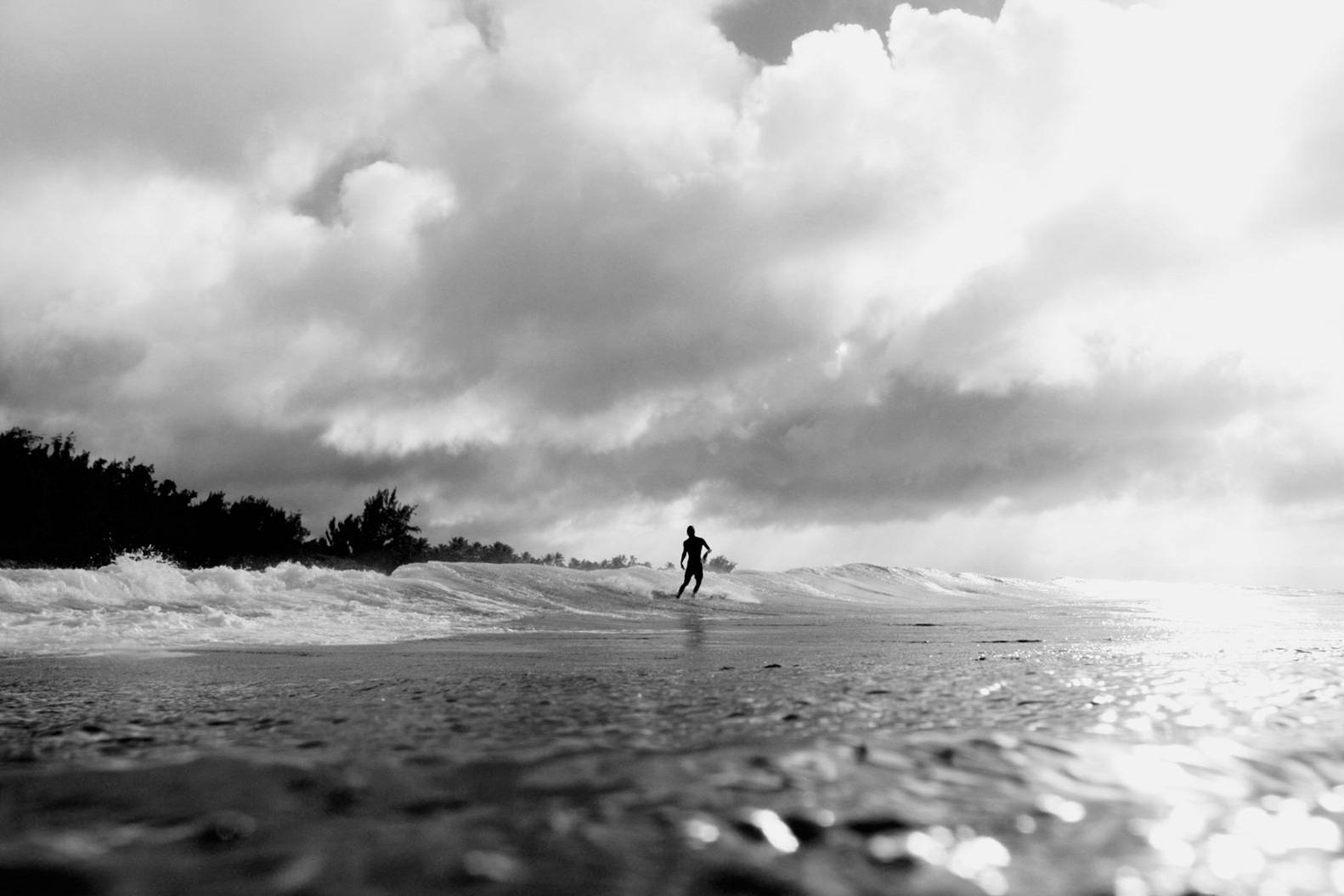You’ve probably seen the fluro white teeth and svelte tan of Ronnie Blakey on the WSL webcast over the last few years. Paired up with Peter Mel most of the time, he’s one of surfing’s more knowledgable and hilarious commentators. Given Ronnie gets paid to travel the world, watch the world’s best live and then talk about it into a microphone, we reckon he has one of the better jobs on the planet (aside from actually being a pro). We chatted with him about how he got into the game, what are the best and worst things about being a commentator, and how Strider went from bumbling boffin, to insightful surf ninja.
Take a read 🙂
BACKGROUND
Empire Ave – Where abouts did you grow up?
Ronnie Blakey – Grew up around South Golden Beach and New Brighton (Jeremy Byles territory) just north of Byron. Went to high school at Mullumbimby.
EA – And where are you living now?
RB – Avalon on Sydney’s Northern Beaches.
EA – What was your first surfboard?
A secondhand Freelance channel-bottom shaped by Bruce Greig. First custom was a Hot Stuff shaped by Gill Glover.
EA – What does your day to day look like?
RB – If I’m not at an event my days revolve around family. My wife and I have three children (14, 8 and 6) so a typical day includes getting the kids to school, hopefully scoring a wave and getting some work done before pick up and then it’s into all that good family stuff.
EA – Early jobs?
RB – First job I washed cars for the local driving instructor. Just before I graduated high school I was appointed Assistant Editor at Tracks Magazine, then became Tracks Online Editor before moving on to become Editor at the now defunct Waves Magazine. I worked in publishing for around nine years, then I was working as a freelance marketing consultant for Red Bull Australia and Electric Visual. I started a small marketing creative company which I gave away once the commentary position became more of a full time gig.
EA – How did those jobs define who you are now?
RB – The job with Tracks was huge and set me on my way in the surf industry. I gotta thank Neil Ridgway and Wayne Dart for that opportunity and my brother, Vaughan, for recommending me for the position. Experience in publishing has definitely helped me in my role as a commentator. When you’re constructing mags there’s so much focus on growing your circulation and to do that we were constantly considering our audience and endeavouring to produce content that would engage, entertain and empower them. The publishing experience was one thing but the people that I got to work alongside were critical in influencing me and gearing me up for the position I have now. People like my brother, Ridgway, Darty, Sean Doherty, Sam McIntosh, Campbell Milligan, Chris Searl, Derek Rielly, Jack Bailey, Nathan Johnson, Ben Mondy and Kirk Owers all worked at or for the same company at different stages and went on to do good things.
EA – How did you get into commentating WSL events?
RB- Surf events often had magazine partners 15 to 20 years ago because mags were the best way to cover and promote a contest. As part of those sponsorships the magazines were often asked to provide a commentator. So we’d head off to cover the event and do a little commentary. Initially it was just beach commentary but once webcasts came into the picture in the early 2000s I found myself doing online broadcasts too. Stirling Howland (formerly Billabong) and Mark Warren (formerly Quiksilver) were two individuals driving the online surf broadcasts to new levels in the early years and they gave me great opportunities and taught me a lot.
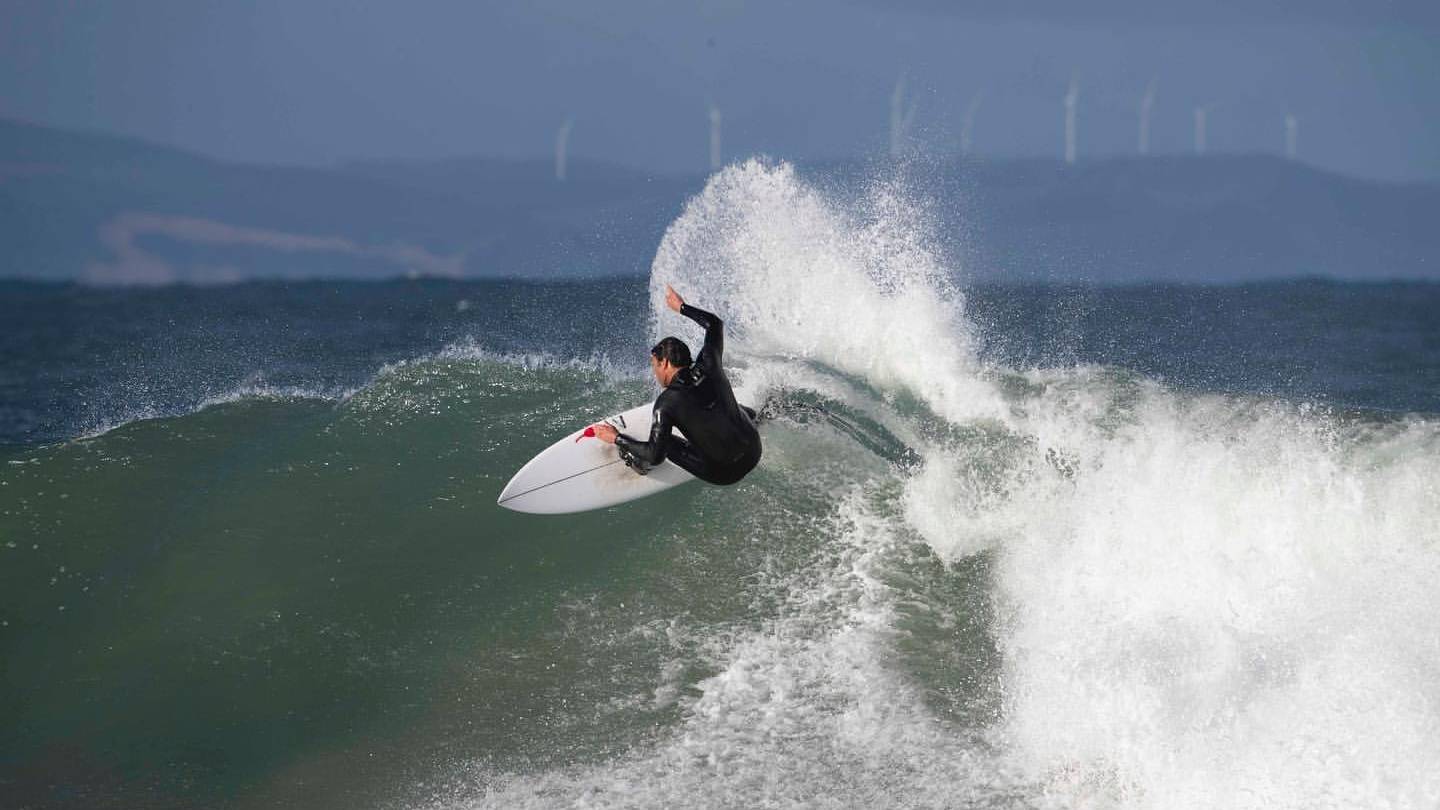
WSL COMMENTATING
Empire Ave – Who’s the hardest working person on the WSL Commentating panel and why?
Ronnie Blakey – I’d say Joe. He’s a true professional, does his homework, gets to events before the rest of us to do additional voiceover work, rarely sits out tour stops and tackles awards nights and presentations like a boss. In saying that nobody runs around an event site as much as Rosy Hodge with her roving cameramen. She generally racks up over 12kms a day depending on the location. There’s Strider too… We often say has the best seat in the house but he’s wrinkled beyond recognition after sitting in the line-up for more than seven hours a day at some events. I’ve also seen Strider get sets on the head at Waimea and Pipe. He loves it though. I guess it’s up for debate but my call for hardest worker is Joey.
EA – Do you guys get any kind of coaching at all for how to speak, what to say etc. ie what kind of support do you get?
RB – Over the course of my commentary career I’ve had plenty of great advice and tips from people I’ve worked alongside at ASP, FuelTV, Fox Sports and now with the WSL. The WSL have brought in some individuals with great broadcast experience to offer us feedback each season. Some of us lean on each other for feedback too and I find that’s always really valuable. As for support once the show is rolling there’s prompts from the director on when we’re coming in and out of breaks or throwing to various content pieces but within our basic structure we can take the conversation wherever we like. At WSL there’s such a hard-working production crew and we get good stats and information packs, in saying that I think the best research you can do is your own.
EA – It seems like you’ve recently been let off the leash a little to critize judges calls etc and put in personal opinion (which we love). Is that true? Or is it just an evolution?
RB – I think it’s part of the evolution but a few people have said that to me lately. Erik Logan the new President of Content, Media and Studios is definitely encouraging it. I feel it’s always been there but some viewers want us to slam the judges. I get that but I think we have a responsibility, even when we have voiced that we disagree, to offer an explanation for judging decisions and try help the audience get their heads around why a score or call went a certain way because it is so subjective.
EA – Strider has gone from terrible to terrific in his calls. How? Why? What’s he doing that we don’t see behind the scenes?
RB – I remember the first time they put him in a host role by himself, it was like when Garth tried to host Wayne’s World without Wayne. He laughs about that day now. When he came on he had less broadcast experience than anyone on the team but it took him no time to figure it out. He’s a super smart guy, a great communicator and an amazing surfer so he’s got great knowledge to pass on. He loves his job and it shows. He’s the most loudest character on the broadcast and he brings great life to the show. When work is done for the day he also makes the job more fun. I’m a huge fan.
Empire Ave – Is there a short delay like ‘live’ TV where you can cut something it you fuck up? Or are you just on the hotplate?
Ronnie Blakey – Nup, no delays. You can seriously burn yourself if you fuck things up. Minor slip ups are inevitable in live TV though so if you butcher something you gotta move on swiftly.
EA – Do you guys have a ‘rule’ book of what you’re allowed to say and not? Or it it unspoken but known that you can’t tell everyone KP called the comp off so he can get pitted?
RB – Haha! That never happened… or did it? Maybe KP and the entire commentary team was getting shacked. There’s basic broadcast guidelines and rules that would apply to commentators in any sport but for the most part we’re asked to employ common sense.
EA – How much prep work goes into the morning show and post show? Is it off the cuff or do you guys sit down, map out and plan, or do WSL had you the ‘you can’t script this’ script.
RB – The first day of the window is really the only time we do an in-depth morning show these days. They’re well planned and designed to set the scene, identify favourites and discuss big stories like the title race, injuries and wildcards. All the other days of the window now we’re looking to capitalise on the conditions and dive straight into the heats.
EA – What are the best and worst things about being a commentator?
RB – The best is watching people do amazing surfing. The worst is watching other people surf, sometimes you just wanna get out there so bad.
EA – Do you get rattled about the hate on social media, or is it just part and parcel of being on the live stream? How do you deal with that shit?
RB – I think it’s definitely part of being in that position. I try and block it out but most barbs will break through the thickest of skin just a little. I try and ignore it.
EA – How do people get paired up on the panel? Do you guys get a say, or the roster’s just handed to you?
RB – We are invited to give feedback and suggestions but at the end of the day it’s the producer’s call.
EXTRAS
Empire Ave – What do you listen to while you work?
Ronnie Blakey – If I’m at an event I usually just listen to the broadcast so I don’t miss anything. If I’m doing emails and stuff I’ll listen to a wide variety of stuff. Lately I’ve been playing Tommy Guerrero. Easy listening background sounds and there’s no lyrics so it’s not too distracting.
EA – What are you currently reading?
RB – Dark Emu by Bruce Pascoe.
EA – The best advice you’ve ever recv’d?
RB – Action breeds motivation. That was written on a post-it note on Sam McIntosh’s desk when I guest edited some issues of Stab years ago. It works. Another I like is ask for forgiveness not for permission.
EA – What apps, software, tools can’t you live w/o for life/work
RB – Definitely need my MacBook. Rarely use it these days but can’t do everything on my iPhone.
EA – Where do you love to travel, and what won’t you travel without?
RB – New places and open spaces. Love checking cities but more psyched on getting away from them and getting back to nature.
EA – Favourite tour stops?
RB – J-Bay, Hawaii, West Oz.
For more around the topics we spoke about, hit the below links :
*Ronnie Blakey on IG
*STAB Interview (pod)
*Yamba Vibes
Of if you’re chasing some more interviews, hit the below:
*Jun Jo on In4mation, Vast and the Momentum Generation
*Sam Coombes from TCSS on STAB, Art and MTV
*Bosko talks shooting Film, Sports & the Surf Industry

